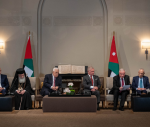You are here
Women's political participation in Jordan challenged by financial barriers, violence - report
By Rana Husseini - Dec 11,2024 - Last updated at Dec 12,2024
AMMAN – Over 60 per cent of female candidates who ran for the 2024 Parliamentary elections said that lack of financial resources was a major barrier during the election campaigns, a local report revealed on Wednesday.
Some 60.48 per cent of the women candidates pointed out to lack of financial support from political parties and tribal networks, according to the report that was prepared by the Karak Castle Centre for Consulting and Training (KCCCT).
Many candidates were compelled to rely on personal funding or loans to sustain their campaigns, the report stated.
Funded by the Canada Fund for Local Initiatives (CFLI), the report was entitled: “Monitoring Violence against Women in Jordanian Elections Report, Parliamentary Elections 2024”.
Deputising for Minister of Political and Parliamentary Affairs Abdul Monem Odat, the ministry's secretary general Ali Khawaldeh said that the government rejects all forms of electoral violence.
The ministry official stressed the need to “reject societal violence in all its forms, especially towards women”.
He also called for enhancing community awareness through efforts such as the efforts initiated by the KCCCT.
The report aimed to illuminate the 2024 Jordanian parliamentary elections by documenting the violence faced by women during this electoral cycle, whether as candidates or voters, KCCCT Executive Director Isra Mahadin told the gathering.
It also responds to the urgent need to document and analyse this issue, not only to highlight its scale but also to provide actionable recommendations for stakeholders to protect women's rights and enhance their political participation, Mahadin added.
The report revealed that 44.73 per cent of the female candidates reported “experiencing familial and tribal pressures to withdraw from the electoral race”.
These pressures ranged from direct threats to social coercion aimed at preserving family or tribal unity, according to the report.
Meanwhile, 28.15 per cent of the comments on female candidates' social media pages were abusive, the report stated.
These included bullying based on appearance, questioning their qualifications, and harsh criticism related to their social or political backgrounds, the report added.
The report recommended raising public awareness by launching national campaigns to challenge stereotypes about women’s roles in politics and integrate topics on women’s political representation into educational curricula.
It also called for enforcing stringent laws to criminalise the use of illicit funds, including vote-buying, and address economic violence against women candidates.
Among the recommendations was the need to protect women from electoral violence.
Additionally, the report called for establishing specialised units to receive complaints from female candidates and provide legal and psychological support.
Mahadin told the gathering that she is certain that the “report’s recommendations will contribute to improving policies that will work to protect women and enhancing their participation in future Parliamentary elections”.
Established in 2017 in Karak Governorate, the KCCCT is a women-led organisation committed to empowering women and youth in Jordan. The centre is dedicated to advancing economic, political, and legal empowerment while fostering professional skill development.
Its mission is to create equitable and effective opportunities for active participation in social development, guided by democratic principles, human rights and the rule of law.
Related Articles
AMMAN — In an effort to combat cyberbullying against women and in preparation for the upcoming elections, a local organisation on Monday lau
AMMAN — The Karak Castle Centre for Consulting and Training has launched a new awareness campaign under the slogan "Her Right to Participate
AMMAN — Cyberbullying and defamation on social media topped the list of electoral violence against female candidates who ran for the 2024 Jo

















